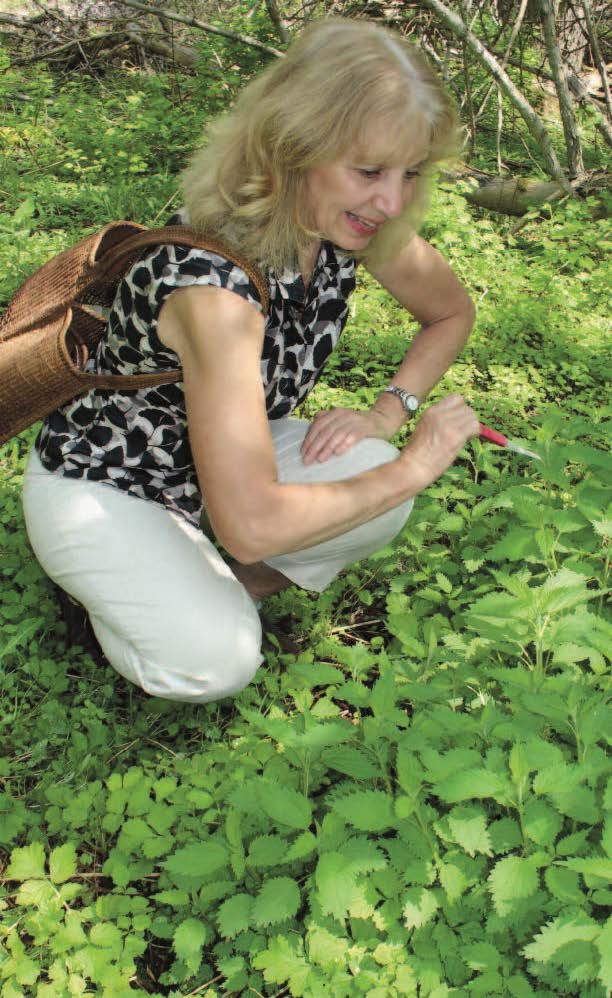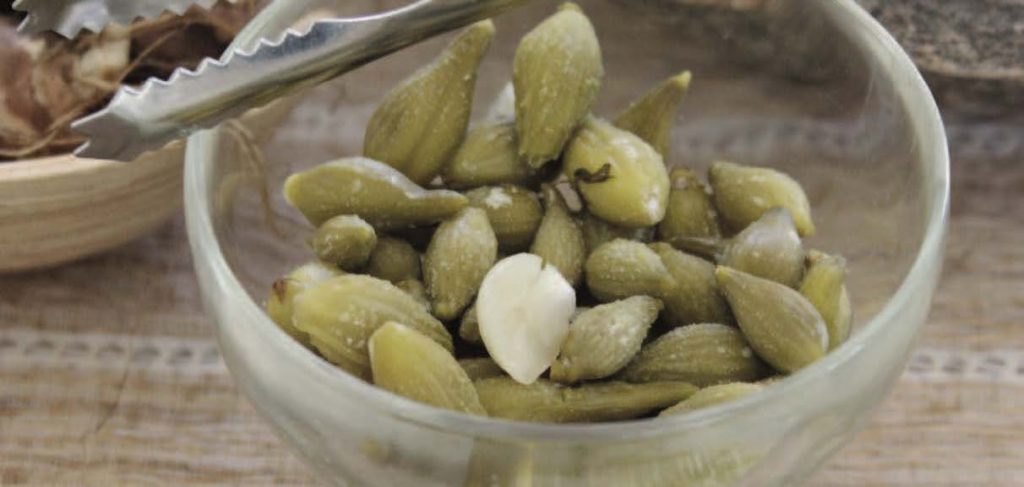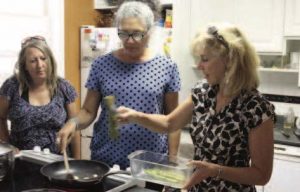Foraging from forest to table
By Peter Johansen | May 2019

Carolyn Langdon says it’s okay, and I trust her. I’ve joined a small group of folks searching for weeds we’ll later eat. Right now, we’re harvesting Japanese knotweed, one of Ontario’s most invasive plants. It grows like Topsy, spreads like wildfire. It endangers wildlife habitats, chokes other plants, punches through concrete and asphalt. But Carolyn says it’s also healthy and delicious, so we’re gathering some along a highway in the Haliburton Highlands south of Algonquin Park. Pick enough, she says, and she’ll teach us how to use it for everything from crudités to custard pie.
Armed with a gathering basket and paring knives, we get a lesson on the spot. Carolyn shows us how knotweed resembles bamboo, and can grow as tall as a person. But we’re seeking shorter, newer plants, which can easily be cut with a knife. She peels off the outer layer of a stalk and has us nibble it raw. It’s like eating rhubarb.
Over the course of the day, we’ll sample other treats plucked from roadside ditches, open fields, woodlands — even the front lawn of Windfall Food Forest, the home Carolyn shares with husband Marty Scheller near Minden, Ontario. Our bounty will include daylily buds, garlic mustard, stinging nettle, milkweed pods, pine pollen, and a few wild leeks.
“If I can turn people on to all the abundance in the forest,” she says, “then they will protect it from logging and other destructive development. Learning about the culinary and medicinal qualities of plants is an extension of valuing the forest — and respecting the knowledge of the indigenous people who knew what it took to live from the land.”
We move to a sylvan glade near Carolyn’s home. We traipse past trilliums and slightly narcotic wild lettuce, because it’s wild leeks we’re after. They’ll eventually go into a soup, along with Jerusalem artichokes, two kinds of potatoes, stinging nettle and a titch of dill pickle juice. But first we must gather the leeks. It’s careful work. “This is really a threatened species,” Carolyn says.“You only want to take a quarter of the plant so it’ll keep growing. It takes four to six years for a leek to mature from seed. They were so popular in Quebec restaurants that commercial foragers basically wiped out the crop there.”
Carolyn’s workshops encourage sustainability. Milkweed is required by Monarch butterflies, for example. She’ll use only parts of the plant they don’t need. She’ll pluck only a leaf or two from a wintergreen plant. She won’t throw out the weeds from her garden — chickweed, lamb’s quarters, purslane. “Some of these common garden weeds have a higher nutritional value than the spinach and brassicas we’re actually growing.”

No surprise, then, that her front yard is also ripe for the picking. Young basswood leaves make dandy salad greens, she says, giving me a leaf to try: it’s tastier than iceberg lettuce, but not bitter like arugula. Her 11 oak trees “produce a prodigious amount of nuts, a great survival food,” she says. She turns chaga, a rock-hard fungus that grows on birch trees, into a cordial.
Our foraging done, we come back to learn how to prepare our harvest. Some of the dishes have been prepared in advance, but she readily shares her secrets. “I just take recipes I like from cookbooks and adapt them,” she says. “It’s never the same twice.”
That variety entices one of my fellow guests, Marla Force of Haliburton, to return each year. “I always learn a lot, no matter how often I’m here,” she says. “What’s available changes with the season, so I come at different times.” Cattails may be the featured ingredient in July, milkweed pods in August, wild berries and mushrooms in September. Today’s feast includes Carolyn’s take on okonomiyaki, a savoury Japanese pancake traditionally made with shredded cabbage. In her version, everything from daylily shoots to nettle broth is used. It’s tasty and filling.
Carolyn comes by foraging honestly: her grandmother took her on walks to point out native plants; her mother made jams and jellies from wild raspberries and black cherries. They provided “the early sparks to a lifelong interest,” she says, which she built on through hikes with the Bruce Trail Club and optional outdoor activities at conferences. “There is always someone willing to share what they know,” she says.
That, plus trial and error. Confides husband Marty: “Carolyn wouldn’t want me to tell you, but when she was getting into this, she served me some milkweed pods. It was like eating a pillow. Fluffy white stuff floated out of my mouth. ‘I guess I need to use younger pods,’ she said.”

Langdon’s one-day workshops, named Wild Edibles— Haliburton, are scheduled into October. For details and registration, visit facebook.com/wildedibleshal-iburton or email windfallfoodforest@gmail.com. Most sessions cost $55-$65. Her farm is at 1079 Bat Lake Road, between Haliburton and Minden.



